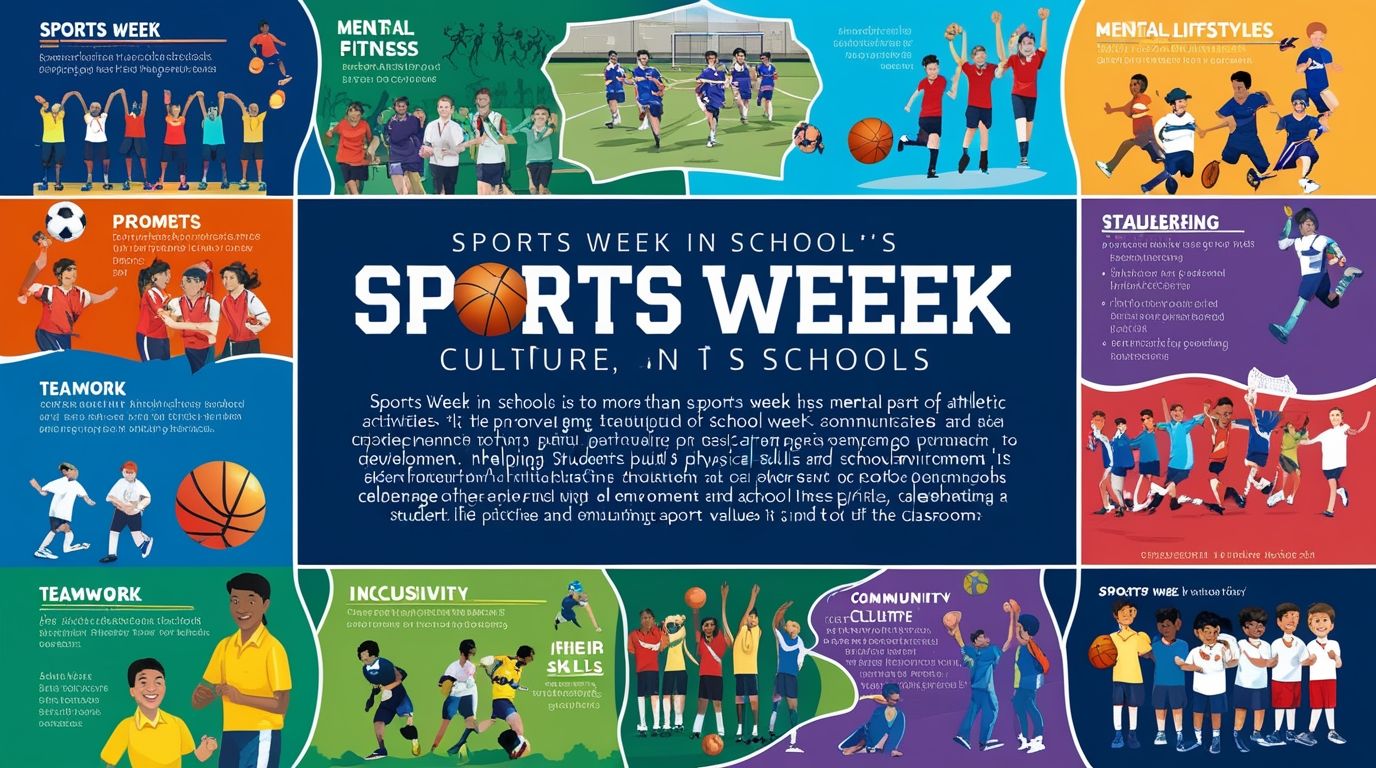Introduction
The Importance of Sports Week Culture in Schools and Its Impact, Sports have always been an integral part of education, offering students the opportunity to develop physical, mental, and social skills. In schools, this integration is often highlighted during events like Sports Week, a celebration that involves a wide range of activities focused on athleticism, teamwork, and sportsmanship. Sports Week culture in schools goes beyond just playing games; it fosters holistic development, builds a sense of community, and promotes physical health. This article delves into the significance of Sports Week culture and its far-reaching impact on students, educators, and the school environment.
The Concept of Sports Week Culture
Sports Week is a dedicated period in the academic calendar when students and teachers alike engage in various sports activities. These can range from traditional sports such as football, basketball, and athletics to more creative or recreational games that cater to students of all skill levels. The idea is to create a vibrant, inclusive environment where competition is balanced with fun and participation.
In many schools, Sports Week is more than just a break from regular academic routines. It is a celebration of physical education and teamwork, and it often involves inter-house competitions, group challenges, and sometimes even involvement from the local community or parents. The goal is to highlight the value of sports as part of education, not just in terms of physical fitness, but also in terms of social skills, mental well-being, and personal growth.
Building a Sense of Belonging and Community
One of the most significant impacts of Sports Week culture is its ability to build a sense of belonging and community among students. Schools often organize students into houses or teams, encouraging them to work together to achieve collective goals. Whether it’s the relay race or a tug-of-war competition, students learn to collaborate, support each other, and celebrate their shared victories or losses.
This sense of belonging is crucial, especially for younger students who may be trying to find their place in a large and often intimidating school environment. Sports Week provides a platform for students to form connections with their peers, build friendships, and develop a sense of identity within their teams. The collaborative nature of these activities fosters unity, reduces social barriers, and creates a positive school culture where every student feels included and valued.
For older students, the sense of community during Sports Week helps reinforce leadership skills, especially for those chosen as team captains or house leaders. These roles teach students how to motivate others, handle responsibility, and work through challenges—skills that will be essential throughout their academic and professional careers.

Physical Fitness and Health Promotion
One of the most apparent benefits of Sports Week is its emphasis on physical fitness. In an era where sedentary lifestyles and excessive screen time are major concerns, Sports Week serves as an excellent reminder of the importance of physical activity. During this period, students engage in a range of sports, often for extended periods each day. These activities promote cardiovascular health, muscular strength, flexibility, and overall physical fitness.
Additionally, the excitement surrounding Sports Week often encourages students to take an interest in sports that they may not have considered before. For some, this can be the catalyst for pursuing a sport more seriously, even beyond school. Studies have shown that students who engage in regular physical activity tend to perform better academically, as exercise boosts brain function, improves focus, and enhances memory.
By promoting an active lifestyle, Sports Week can help students develop healthy habits that extend beyond the classroom. Physical health is an essential component of overall well-being, and instilling these habits at a young age can reduce the risk of obesity, diabetes, and other health-related issues later in life.
Boosting Mental Health and Well-being
Sports Week is not only beneficial for physical health but also for mental well-being. Participating in sports can reduce stress, improve mood, and increase self-esteem. The adrenaline rush that comes from competing, coupled with the joy of teamwork and collaboration, can provide students with a much-needed mental break from the rigors of academic life.
Moreover, Sports Week promotes the development of emotional resilience. Whether a student wins or loses, they learn to handle outcomes with grace and dignity. Losing a match may be disappointing, but it teaches students valuable lessons about perseverance, effort, and sportsmanship. These experiences help students develop a growth mindset, where challenges and failures are viewed as opportunities for growth and improvement.
In a school setting where academic pressure can sometimes feel overwhelming, Sports Week offers a constructive outlet for students to release pent-up energy and stress. The emphasis on fun, teamwork, and enjoyment can significantly reduce anxiety and foster a positive mental health environment within the school.
Encouraging Inclusivity and Diversity
Another critical aspect of Sports Week culture is its potential to promote inclusivity and celebrate diversity. Sports, by their nature, are universal, and their appeal cuts across social, cultural, and economic boundaries. During Sports Week, students from all backgrounds have the chance to participate, collaborate, and showcase their talents.
Schools that design their Sports Week to include a variety of activities beyond traditional competitive sports create a more inclusive environment. For example, incorporating non-competitive games, dance, or recreational activities ensures that students of all skill levels can participate. This approach breaks down stereotypes about who can and cannot excel in sports and creates a more inclusive atmosphere where everyone feels capable and valued.
Moreover, Sports Week often exposes students to different sports from around the world, fostering an appreciation for cultural diversity. Whether it’s introducing students to cricket, volleyball, or martial arts from various cultures, schools can use Sports Week as an opportunity to broaden students’ understanding of global sports traditions and promote cultural exchange.

Developing Life Skills
Sports Week plays a vital role in the development of essential life skills. The nature of sports teaches students about time management, discipline, communication, and goal setting. For instance, students must balance their time between training for their events and keeping up with their academic responsibilities. This teaches them the importance of organization and prioritization.
Communication is another life skill that sports inherently foster. Whether it’s strategizing with teammates or giving and receiving feedback, students learn how to express themselves clearly and listen actively. These communication skills are transferable to all areas of life, from personal relationships to future careers.
Additionally, sports emphasize the value of perseverance and hard work. Students quickly learn that success in sports is not just about natural talent but also about consistent effort, practice, and resilience. These lessons are particularly impactful during Sports Week, where the focus is on teamwork, collaboration, and achieving collective goals.
Enhancing School Spirit and Pride
Sports Week is a celebration of school spirit and pride. The excitement and anticipation leading up to the event, the shared experience of competition, and the collective celebrations foster a sense of unity and pride in the school community. For many students, Sports Week is one of the highlights of the school year—a time when the entire school comes together to cheer on their teams and celebrate their achievements.
This sense of school spirit can have long-lasting effects on the overall atmosphere of the school. When students feel connected to their school community, they are more likely to be engaged, motivated, and positive about their educational experience. Sports Week acts as a unifying force, strengthening the bond between students, teachers, and the broader school community.
Conclusion
Sports Week culture in schools offers far-reaching benefits that extend beyond the physical realm. It fosters a sense of community, promotes inclusivity, and teaches valuable life skills. The focus on physical and mental well-being, coupled with the celebration of school spirit, makes Sports Week an essential part of the school experience. Through participation in sports, students develop resilience, teamwork, leadership, and discipline—skills that will serve them well in all aspects of life. As schools continue to prioritize holistic education, the importance of Sports Week will only grow, shaping well-rounded individuals prepared to succeed in a globalized, fast-paced world.

7 thoughts on “The Importance of Sports Week Culture in Schools and Its Impact”
Comments are closed.